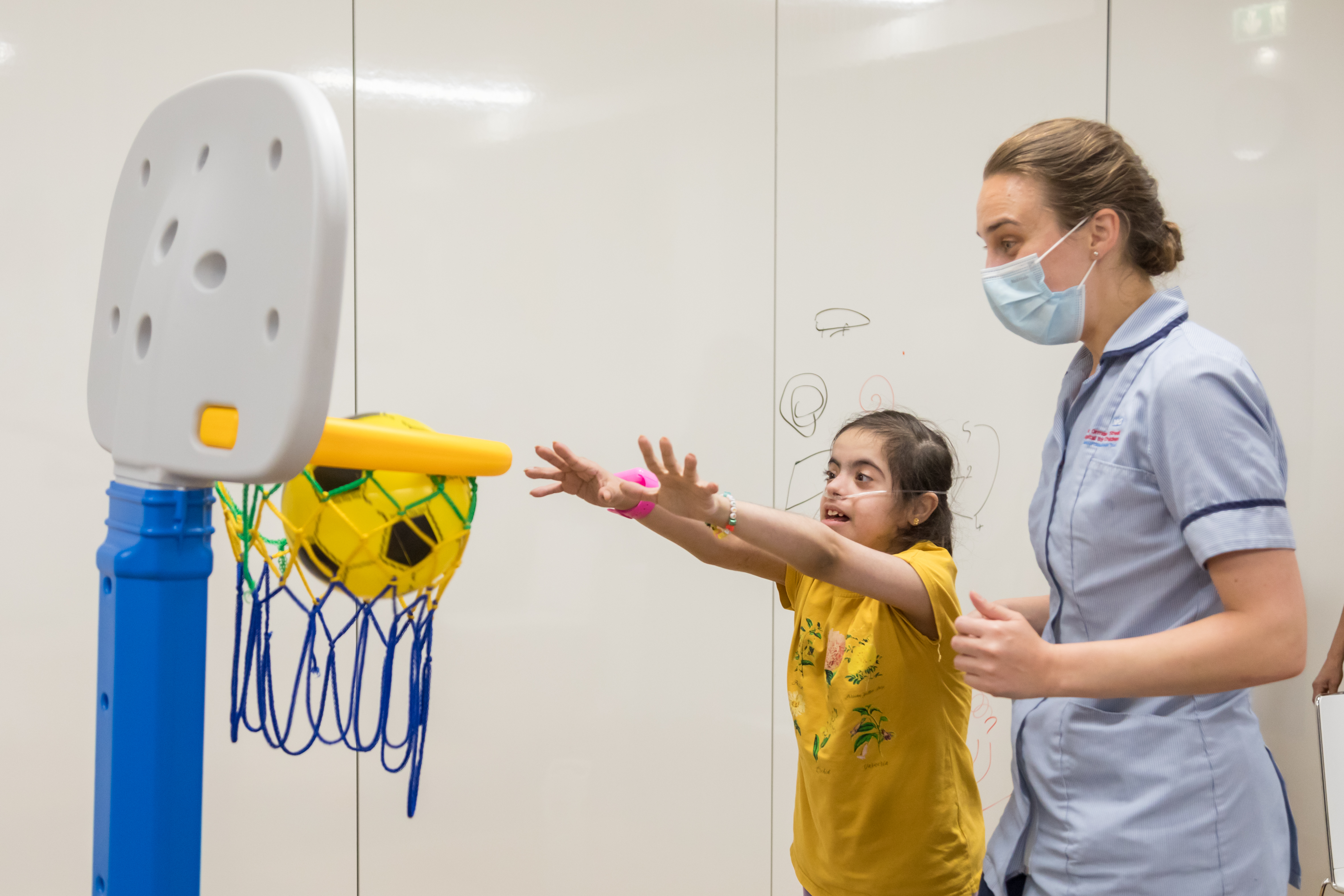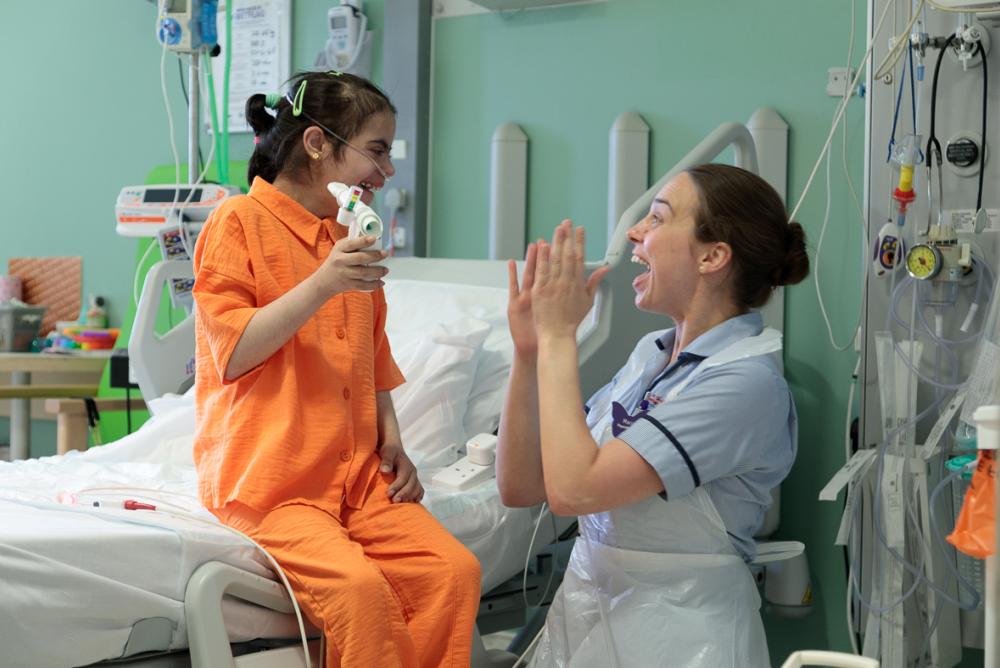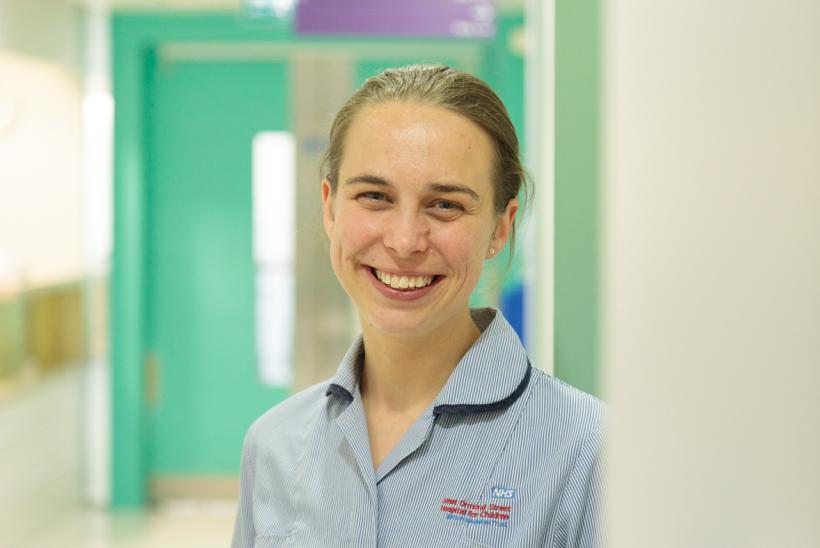Celebrating World Physiotherapy Day: Q&A with Specialist Paediatric Physiotherapist Maria
In recognition of World Physiotherapy Day, we spoke with Maria, a Specialist Paediatric Physiotherapist at Great Ormond Street Hospital for Children International and Private Care (GOSH International & Private Care). Maria provides insight into the role of physiotherapy, its unique aspects in paediatric care, and her own journey in this fulfilling profession.
Maria is a Specialist Paediatric Physiotherapist, leading the inpatient International and Private Care Physiotherapy service at Great Ormond Street Hospital for Children. With a degree in Physiotherapy from the University of Plymouth, Maria has extensive experience in paediatric care. She has worked at other leading hospitals and across various specialties at GOSH. Maria is passionate about providing high-quality care for children with rare and complex conditions.
How would you describe physiotherapy to someone who has never heard of it?
Physiotherapy addresses issues with movement and function, using techniques like exercise and manual therapy. We look at the whole person, not just one part of the body. Many think of physiotherapy as something that helps after sports injuries or broken bones, but it goes far beyond that. Physiotherapists work across all areas of healthcare, from newborns to older people, in hospitals, clinics, homes, and sports settings. Our work can involve helping someone breathe better, recover from a brain injury, manage cancer, or relieve back pain. We collaborate with other healthcare professionals like doctors, psychologists, and nurses, using research and science as the foundation of our care.
What makes paediatric physiotherapy different from adult physiotherapy?
Children are not small adults, and paediatric physiotherapy requires specialist skills. Children's bodies are still developing, so we have to account for their growth and long-term goals when creating treatment plans. We also need to understand children's developmental stages to assess their needs accurately. Making therapy fun is essential, especially for young children who may not understand instructions. We work closely with parents and caregivers to support the child’s progress.
What inspired you to pursue a career in paediatric physiotherapy?
From a young age, I knew I wanted to be a physiotherapist, inspired by my own experience with physiotherapy growing up. Work experience at a special needs school further fuelled my passion. What drew me to paediatrics was the variety and creativity involved in helping children. Working with families and being part of a child's growth and recovery is incredibly rewarding. I love that no two days are the same, and the continuous learning and development in paediatric physiotherapy keep me motivated.

Maria doing a fun session with patient
When might a child need physiotherapy?
There is a wide range of reasons a child might need physiotherapy, and at GOSH, we see children across numerous specialties, including neurology, cancer, orthopaedics, and more. For example, a premature baby or a child with a genetic condition affecting their muscles or respiratory system may need physiotherapy. A child might require rehabilitation after a sports injury, or they may need help recovering from surgery. Early intervention is critical, especially for babies and young children, to improve their developmental outcomes.
How do GOSH therapists cater to children's needs?
Our therapists have extensive experience in paediatric care and work as part of a multidisciplinary team to address each child's physical, social, and mental health needs. We hold regular meetings to ensure seamless communication, and we collaborate with play specialists who help make therapy enjoyable and engaging. I believe in making therapy fun—the best sessions are those where the child doesn’t even realise how much work they’re doing because they’re having such a good time.
Why is physiotherapy important in a child’s treatment plan?
Physiotherapists play a crucial role in the multidisciplinary team, from supporting diagnosis to providing treatment. At GOSH, each child has a personalised management plan. For example, a child with Cystic Fibrosis may receive physiotherapy to reduce the risk of chest infections and improve their fitness, while early intervention Physiotherapy for a child with neurological impairments can help improve their function and longer-term outcomes. Physiotherapy isn’t just about treating illness—it’s about helping children live fulfilling, active lives.
What special approaches or resources does GOSH offer for paediatric physiotherapy?
GOSH provides state-of-the-art resources like hydrotherapy pools, specialist gyms, and gait analysis systems. We use advanced techniques, including neuromuscular electrical stimulation, to optimise treatment. Our physiotherapists are dedicated to research and continually updating their skills to ensure we offer the best possible care. We also collaborate with orthotists to provide custom-made splints and work with clinical specialists for treatments like Botulinum Toxin injections.
What do you enjoy most about working with children at GOSH?
Every child is unique, and I feel privileged to get to know them and their families, especially those who stay at GOSH for extended periods. The resilience and positivity of our patients inspire me daily. The impact we can have, whether helping a child regain the ability to walk or simply making them smile, is incredibly rewarding. Working in the International and Private Care department also offers the opportunity to learn about different cultures and languages, which I find fascinating and enriching.
World Physiotherapy Day highlights the importance of physiotherapy in health and well-being. Maria’s dedication and expertise showcase the profound impact paediatric physiotherapy can have on children's lives, making it a vital part of healthcare at GOSH and beyond.
Maria during a sessions with one of her patients



